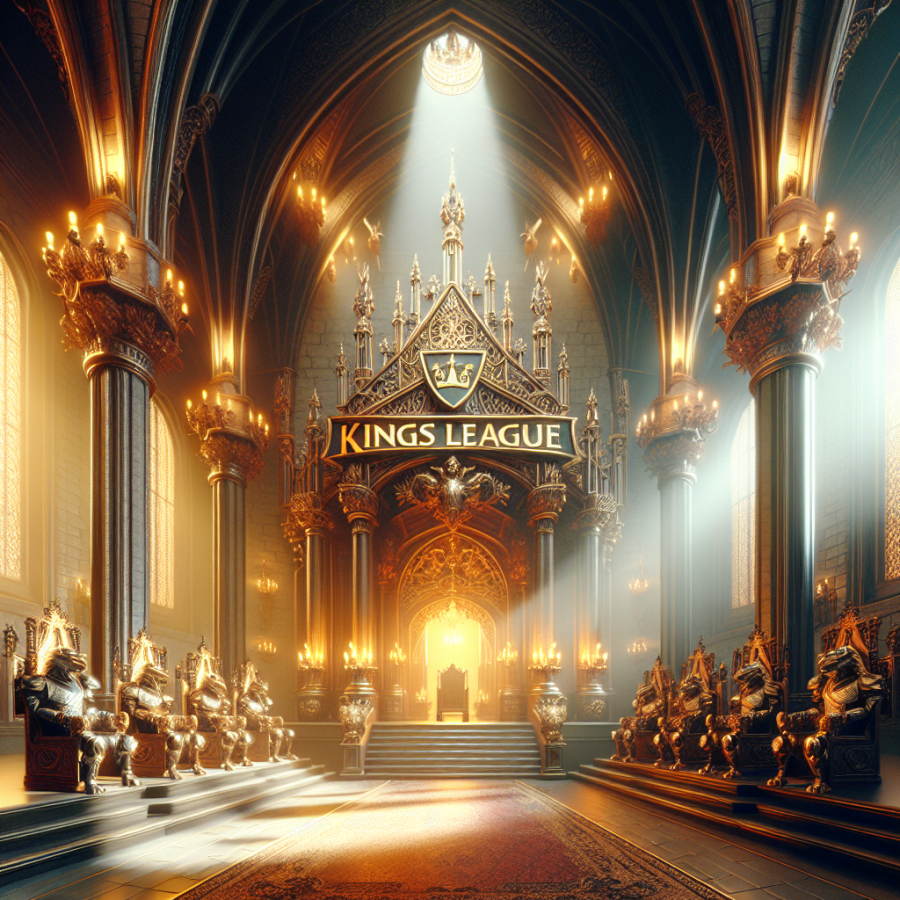Exploring the meteoric Rise of Kings League in the Competitive Gaming Arena
Kings League has taken the competitive gaming world by storm, emerging as one of the most exhilarating and rapidly growing eSports tournaments. At its core, Kings League presents a captivating blend of strategy and skill, pitting players against each other in a medieval-themed contest that strikes a perfect balance between accessibility and depth. Its unique appeal is multifaceted, resonating with both hardcore gamers and newcomers alike, propelling it to the forefront of eSports conversations.
The structure of the Kings League is one of its standout features, offering a well-thought-out season with both league play and playoff rounds that provide continuous excitement for viewers. Teams comprised of top-tier talent, as well as new rising stars, compete for supremacy over multiple months, which ensures sustained engagement for the audience and ample opportunity for rivalries to bloom. The league culminates in a grand final event, where the most skilled contenders battle for the crown and significant prize money, generating an atmosphere of high stakes that's nearly palpable through the screen.
What's particularly intriguing about the rise of Kings League is its integration of real-world strategies with in-game mechanics, demanding a high level of tactical acumen from its players. The game itself offers a rich tapestry of units, spells, and structures, allowing for an almost infinite array of strategies, which in turn leads to diverse and unpredictable matches. This depth has given rise to an entire ecosystem of coaches, analysts, and strategists, whose roles are to dissect every aspect of the game to find winning formulas.
Another factor contributing to the game's increasing prominence is the community engagement model it employs. Kings League has successfully leveraged social media, streaming platforms, and interactive live events to create a sense of community and participation that goes beyond passive viewership. Fans can vote on various aspects of the competition, have a say in team decisions, and sometimes influence the game's development, which has fostered a strong sense of ownership and loyalty among the player base.
Furthermore, Kings League's appeal extends to its exceptional production value. It features high-quality broadcasts with engaging commentary, in-depth analyses, and impressive graphics that make each battle as thrilling to watch as any traditional physical sport. The game's developers have embraced advancements in AR and VR to provide immersive viewing experiences, blurring the lines between the virtual and the real and pushing the envelope on what an eSports event can deliver.
Read also:
Urban Balance: The Rise of Street Unicycling Culture
Strategies for Success: How Top Players Dominate in the Intense World of Kings League
The Kings League presents a unique battleground where strategy meets tenacity, and only the most astute and adaptive players can hope to dominate. Unlike many other competitive platforms that heavily rely on brute force or sheer grinding, success in the Kings League is all about understanding the nuances of the game and outsmarting your opponents.
First and foremost, top players know the importance of meticulously planning their conquests. Every move within the Kings League is a blend of calculated risk and predictive positioning, as each decision can potentially alter the course of the game. Veteran players often engage in extensive research to understand the strengths and weaknesses of their units, as well as those of their adversaries. They harness this knowledge to develop formations that maximize their odds of victory and exploit their opponents' vulnerabilities.
Resource management is another vital area where top players shine. The Kings League is unforgiving when it comes to how players allocate their in-game resources, such as gold, troops, and materials for crafting powerful items. Efficient resource management can mean the difference between a kingdom thriving or falling into obscurity. Successful players prioritize investments that will yield the greatest returns, such as upgrading their stronghold to unlock new units or investing in technology that will give them an edge in future battles.
When it comes to actual combat, the elite players are those who can adapt their strategies on the fly. They are not only prepared with a solid initial plan, but they can also pivot as the battle unfolds, responding to their opponent's moves with cunning counter-strategies. They also understand the importance of espionage and scouting, using spies to gather vital intelligence on enemy formations and plans.
Alliances and diplomacy play a crucial role in the Kings League saga. Top players often forge strategic partnerships to fortify their positions and gain access to shared resources or combined military might. However, they also remain vigilant, as alliances can be as fickle as the tides of war. Being able to negotiate, maintain, or dissolve alliances at the optimal moments can turn the tide of the campaign and lead to ultimate dominance.
Finally, persistence is a common trait among the Kings League champions. They analyze their failures as much as their victories, learning from each encounter and constantly refining their approaches to combat and kingdom management. The tenacity to continue in the face of defeat is often what separates the victors from the vanquished.
As the Kings League continues to captivate audiences and players alike with its blend of strategic gameplay and regal power struggles, it's worth exploring the reasons behind its meteoric rise in the professional gaming scene. The league has managed to blend traditional sports dynamics with a unique esports approach, and this unprecedented combination has been a recipe for success.
First and foremost, the Kings League has introduced a novel perspective on player engagement and loyalty by infusing the gaming experience with a rich fantasy narrative. Players aren't just competitors in a digital space; they're monarchs battling for their kingdoms, which adds a layer of depth to their in-game personas and storytelling opportunities. The intentional blurring of lines between gamer, character, and storyteller has led to a unique community culture that thrives on lore as much as it does on gameplay.
The game's developers have also excelled in creating a robust competitive ecosystem that appeals to both casual fans and hardcore strategists. The art of warfare in Kings League demands a keen understanding of various units, the land, and intricate battle tactics. This complexity ensures that the game remains fresh and challenging, promoting an environment where professional players can shine and showcase their skills.
Balancing the game has been a key focus for the developers. In the Kings League, no single strategy reigns supreme for long; with frequent updates and balance changes, the meta is in a constant state of flux. This requires professional players to adapt and evolve continually, maintaining a dynamic competitive scene that is as unpredictable as it is captivating.
In addition to gameplay and balance, the structure of the Kings League has drawn inspiration from traditional sports leagues. There are regular seasons, playoffs, and championships, providing viewers and players with a familiar rhythm and narrative arc that’s easy to follow. This structure has fostered a growing base of passionate fans who avidly follow their favorite teams and players through triumphs and defeats, just as they would in traditional sports.
The financial model of Kings League is another aspect that has attracted professional players and teams. With significant prize pools, sponsorships, and streaming revenue, there's a viability for career gamers within the ecosystem. This economic incentive has driven the quality of play higher and higher, with players dedicating themselves full-time to mastering the game.
Let's not forget the role of live events and broadcasts, which have become lavish spectacles that rival major sporting events in production value.




